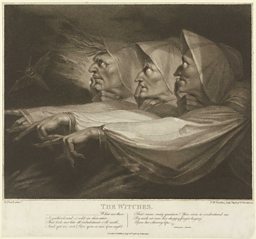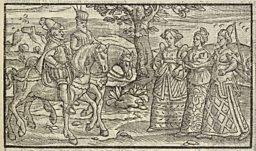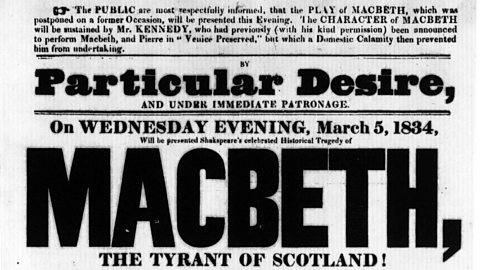'Calamity' overtakes the Scottish Play
Did the curse of Macbeth strike Salisbury?
It is clear from a theatre playbill from 1834 that a previously billed performance of Macbeth had to be postponed at Salisbury’s Theatre because the actor (or amateur) playing the main part was unable to perform due to a ‘Domestic Calamity’.
-
![]()
Much ado near me
Hear more Shakespeare stories on BBC Wiltshire
-
![]()
Shakespeare Festival 2016
The BBC celebrates the genius of the bard

This 1834 Salisbury Theatre playbill starts with an apology: “The public are respectfully informed that the play of Macbeth which was postponed on a former occasion will be presented this evening. The character of Macbeth will be sustained by Mr Kennedy who had previously (with his kind permission) been announced to perform Macbeth…but which a domestic calamity then prevented him from undertaking”.

As noted on the playbill, Mr Kennedy, the gentleman amateur has recovered from his “Domestic Calamity” which led to the initial postponement of the play.

The good news is that audiences at the Theatre, Salisbury would now be able to enjoy his portrayal of Macbeth aka “The Tyrant of Scotland”.
Although there are no further details in this case, playbills would normally note a postponement or cancellation and sometimes they explain why.
More often than not human frailty is the cause. The celebrated actor and ‘character’ Edmund Kean cancelled several performances on account of hoarseness. This could have been the result of straining his voice to fill the large theatres of London. On the other hand, he enjoyed a drink or two and there are anecdotes about the actor turning up for a performance somewhat the worse for wear.

Pumping Up The Drama
The audience of the day loved melodrama, with its exaggerated characters and sensational plot twists all designed to appeal to the emotions.
This performance cranks up the melodrama to suit spectators' sensation-seeking tastes.
Macbeth is one of Shakespeare’s most adapted works, and this is probably Davenant’s 17th century version, rather than something more contemporary.
The playbill promises an “Awful appearance of the ghost of Banquo”. There is much made of the role of the witches with quotes in the playbill giving the impression that their importance has expanded:
"And oftentimes, to win us to our harm,
The instruments of darkness tell us truths,
Win us with honest trifles, to betray 's
In deepest consequence."
(Macbeth, Act I, Sc 3)
About Shakespeare on Tour
From the moment they were written through to the present day, Shakespeare’s plays have continued to enthral and inspire audiences. They’ve been performed in venues big and small – including inns, private houses and emerging provincial theatres.

BBC English Regions is building a digital picture which tracks some of the many iconic moments across the country as we follow the ‘explosion’ in the performance of The Bard’s plays, from his own lifetime to recent times.
Drawing on fascinating new research from Records of Early English Drama (REED), plus the British Library's extensive collection of playbills, as well as expertise from De Montfort University and the Arts and Humanities Research Council, Shakespeare on Tour is a unique timeline of iconic moments of those performances, starting with his own troupe of actors, to highlights from more recent times. Listen out for stories on Shakespeare’s legacy on your BBC Local Radio station from Monday 21 March, 2016.
You never know - you might find evidence of Shakespeare’s footsteps close to home…
Craig Henderson, BBC English Regions
'The Scottish Play'
According to a theatrical superstition called the Scottish curse, speaking the name Macbeth inside a theatre will cause disaster.
A variation forbids quoting it within a theatre except as part of an actual rehearsal or performance of the play.
There are various ideas about how this came about – all pure speculation.
Did Shakespeare incorporate real spells in the play or curse it so that no one else could direct it?
The actor Donald Sinden had a more practical theory. It dates back to the days of repertory theatre when each town and village had at least one theatre to entertain the public.
If a play was not doing well, it would invariably get 'pulled' and replaced with a sure-fire audience hit, like Macbeth, which guaranteed full-houses.
So when the weekly theatre newspaper 'The Stage' was published, listing what was on in each theatre in the country, you could see which shows had NOT worked the previous week, and how they had been replaced.
Some may find this rationale for the hex a little mundane, for as any decent manager knows, a frisson of fear is good for the box-office.
Related Links
-
![]()
Shakespeare Lives
The nation’s greatest performing arts institutions mark 400 years since the Bard's death

Did the curse of Macbeth cause a calamity in Salisbury?
Ben Prater talks to Professor Alison Shell from University College, London.
Shakespeare on Tour: Around Wiltshire
-
![]()
Shakespeare's men perform before the King at Wilton in Salisbury
A royal audience in Salisbury
-
![]()
Shakespeare Shadows in Salisbury
Pre-Victorian Wiltshire enjoys 'tableaux vivant'
-
![]()
Marlborough pays a bargain basement price for Shakespeare’s Acting Company
The prosperous market town was a popular venue for Shakespeare’s company of actors
Shakespeare on Tour: Around the country
-
![]()
Lancaster Theatre sparkles with Shakespearean talent
The Grand Theatre in Lancaster, which was once managed by Stephen Kemble
-
![]()
Reading’s Puritans turn away Shakespeare
Shakespeare's men paid not to play in Reading
-
![]()
Belvoir Castle
Belvoir Castle, home of the Duke of Rutland
-
![]()
Did Shakespeare visit Bristol in 1597?
Civic accounts show a high amount of performances in Bath










